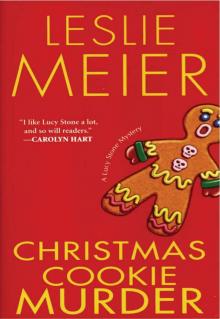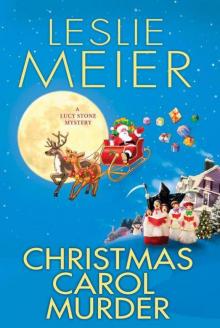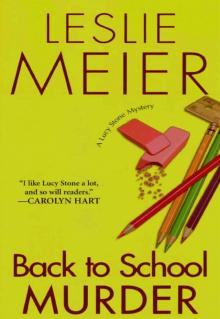- Home
- Meier, Leslie
Back To School Murder #4
Back To School Murder #4 Read online
PRAISE FOR LESLIE MEIER AND HER LUCY STONE MYSTERIES
TURKEY DAY MURDER
“Funny and smart…Leslie Meier is a dab hand with a plot, and her clever whodunit is perfect for those who like their deduction clean, with no gore and plenty of puzzle.”
—The Globe and Mail
CHRISTMAS COOKIE MURDER
“As usual, Meier deftly combines a realistic depiction of Lucy’s life as a hard-working mother with a satisfying mystery plot.”
—Publishers Weekly
VALENTINE MURDER
“Leslie Meier has created a town I’d like to live in and a sleuth I’d love to meet.”
—Jill Churchill, author of Much Ado About Nothing
BACK TO SCHOOL MURDER
“Fans of Jessica Fletcher and her hometown of Cabot Cove will find the same type of pleasure in Leslie Meier’s BACK TO SCHOOL MURDER.”
—The Midwest Book Review
TRICK OR TREAT MURDER
“Enjoy Halloween with Lucy Stone and a wicked mystery.”
—Mystery Lovers Bookshop News
TIPPY TOE MURDER
“A solid mystery.”
—San Francisco Chronicle
“A surprising and intelligently constructed plot.”
—Cape Cod Times
MISTLETOE MURDER
“Meier writes about Christmas in a small town with sparkle and warmth.”
—Chicago Sun Times
Books by Leslie Meier
Mistletoe Murder
Tippy Toe Murder
Trick or Treat Murder
Back to School Murder
Valentine Murder
Christmas Cookie Murder
Turkey Day Murder
Wedding Day Murder
Birthday Party Murder
Father’s Day Murder
Star Spangled Murder
New Year’s Eve Murder
Bake Sale Murder
Candy Cane Murder
St. Patrick’s Day Murder
Published by Kensington Publishing Corporation
A Lucy Stone Mystery
Back To School MURDER
Leslie Meier
http://www.kensingtonbooks.com
CONTENTS
CHAPTER ONE
CHAPTER TWO
CHAPTER THREE
CHAPTER FOUR
CHAPTER FIVE
CHAPTER SIX
CHAPTER SEVEN
CHAPTER EIGHT
CHAPTER NINE
CHAPTER TEN
CHAPTER ELEVEN
CHAPTER TWELVE
CHAPTER THIRTEEN
CHAPTER FOURTEEN
CHAPTER FIFTEEN
CHAPTER SIXTEEN
CHAPTER SEVENTEEN
CHAPTER EIGHTEEN
CHAPTER NINETEEN
CHAPTER TWENTY
CHAPTER TWENTY-ONE
CHAPTER TWENTY-TWO
CHAPTER TWENTY-THREE
CHAPTER TWENTY-FOUR
CHAPTER TWENTY-FIVE
CHAPTER TWENTY-SIX
PREVIEW
ABOUT THE AUTHOR
CHAPTER ONE
“Unexpectedly, at home,” typed Lucy Stone. “Chester Neal, aged 85 years.” She paused and brushed away an annoying strand of hair. It was stifling in the newspaper office and it wasn’t even nine o’clock.
“Ted? I’m not sure about this wording. Shouldn’t we put ‘suddenly’ instead of ‘unexpectedly’? How can death be unexpected when you’re eighty-five?”
“I’d say it was pretty unexpected for Chet,” replied Ted Stillings, the fortyish publisher, editor, and chief reporter for The Pennysaver.
“Really? How did he die?” asked Lucy, leaning back and fanning herself with the press release from McCoul’s Funeral Home.
“Fell off a ladder.”
“A ladder? What was he doing on a ladder at his age?”
“Picking apples, of course.”
“Oh.”
“And from what I hear, the family’s pretty upset. Especially his father.”
“His father!” exclaimed Lucy.
“Just kidding,” said Ted, patting his pockets. “Camera bag, beeper, pens, notebook…I think I’ve got everything. I’ll be over at district court, covering the arraignments. The morning after Labor Day is always pretty busy. If something comes up, call my beeper number, okay?”
“Okay,” said Lucy, turning back to the obituaries. Poor Chet would be missed by a lot of people in the little seaside village of Tinker’s Cove, Maine. He belonged to the Masons, the Chamber of Commerce, the Men’s Forum, and the Village Improvement Society. He was also a deacon at the Community Church and a trustee of the Broadbrooks Free Library.
“Hi, Lucy! Isn’t this weather awful?”
Lucy looked up from the computer and welcomed Karen Baker with a broad smile. Karen’s face was pink with the heat, and her blond pageboy hung limply.
“Hi, Karen. Never fails. As soon as summer is officially over and the kids go back to school, we get a heat wave.”
“You know, I think you’re right. What are you doing here? I didn’t know you were working at the paper.”
“It’s just for a few days. Ted asked me to fill in for Phyllis. Her mother’s sick. What can I do for you?”
“I’ve got an announcement for the PTA Bake Sale this weekend. Am I too late for this week’s paper?”
“Not a bit,” said Lucy, quickly checking the scribbled announcement for date, time, and place.
“What have you done with little Miss Zoë?” asked Karen. Her daughter, Jennifer, and Lucy’s next-to-youngest daughter, Sara, were best friends. Zoë, Lucy’s two-year-old, was a favorite with both Jenn and her mother.
“She’s at the new day-care center, over at the Rec Building. It’s pretty nice.”
“That’s what I hear,” said Karen.
“Actually, I’m wracked with guilt,” said Lucy, casually propping her chin on her hand.
“They’ll take good care of her. Sue Finch is in charge, isn’t she?”
“It’s not that. I’m suffering guilt pangs because I don’t mind leaving my baby. Not one bit. I love it here. Isn’t it great? I feel as if I ought to be wearing a little hat like Rosalind Russell in His Girl Friday.”
“I never noticed it before, but you’re right. This place sure has plenty of atmosphere,” said Karen.
Lucy followed her gaze as she took in the dusty venetian blinds that hung from the plate glass window, and the framed front pages commemorating VICTORY IN EUROPE, JAPAN SURRENDERS, and the famous Niskayuna Mills fire that hung on the walls. The space behind the counter was divided into two areas: Ted’s with its ancient oak roll-top desk and swivel chair, and Phyllis’s, temporarily Lucy’s, with an ugly battleship gray steel desk topped with a computer. A police scanner sat on the counter, occasionally emitting hisses and cackles.
“Notice that smell?” asked Lucy. “That’s hot lead. From the old linotype machine. Ted says you only smell it in hot weather. But the best part is the bathroom. I get it all to myself—nobody follows me in.” At two, Zoë liked to follow her mother everywhere.
Karen chuckled sympathetically. “I know what you mean. It’s been a long summer, hasn’t it? Seemed like the kids would never go back to school. I had to restrain myself when that beautiful big yellow bus pulled up this morning…I was tempted to kiss Moe!”
Lucy grimaced. Moe was a very ugly, very fat school bus driver. “So, how are you going to fill your idle hours, now that the kids are back in school?”
“Well, this morning I took a long shower, and then I had a second cup of coffee and read the newspaper. But I can’t really afford to continue this fabulously luxurious lifestyle. I’ve got to give Country Cousins a call.�
�� Like a lot of women in Tinker’s Cove, Karen worked part-time for the giant catalog retailer, Country Cousins. “What about you? Are you coming back this year?”
“Probably.” Lucy sighed. “‘Thank you for calling Country Cousins. My name is Lucy. How may I help you today?’” she recited. “You know what I’d really like? A job that’s not just a job. Something interesting and challenging, you know?”
“Sure. Why do you think I’ve stuck with the PTA all these years? There, I’m somebody. I’m Madam President. Not just ‘Karen-what-would-you-like-from-our-catalog.’” She shrugged and tucked a strand of damp hair behind her ear. “Good jobs are hard to find around here.”
“I know,” agreed Lucy, pausing a moment to listen to the scanner. Just a routine traffic stop. “If I went back to school, I could teach English. I only need a few credits, you know.”
“That’s a good idea, Lucy. Quite a few of the old fossils at the high school are coming up for retirement.”
“Really?”
“Yeah. And you could substitute in the meantime. It’s decent pay, and no commitment. If the kids are sick or something, you don’t have to go in. School schedule, too. You only work when the kids are in school.”
“Maybe I will sign up for that course.”
“Which one?”
“Over at Winchester. Tuesday and Thursday nights. ‘Victorian Writers (1837-1901), with a special focus on Elizabeth Barrett Browning and Robert Browning.’ I saw it when I typeset the ad. I was so tempted—I majored in English lit, you know. But it seemed awfully expensive.”
“Education is a good investment,” said Karen. “Especially if you could eventually teach. They start at over twenty thousand, plus benefits and summers off. Why, that new assistant principal at the elementary school—Carol Crane—I bet she’s barely thirty and she’s making forty-two thousand.”
“You’re kidding.” Lucy turned to listen to the scanner. Her attention had been caught by a change in the dispatcher’s tone. Usually flat, reciting routine phrases and codes, it had suddenly become imperative.
“Seventeen and Nineteen, report to One-One immediately. Do you copy?”
“What’s One-One?” asked Karen.
“Let me see,” said Lucy, reaching for a laminated sheet tacked above her desk. She scanned the list and raised an eyebrow. “The elementary school.”
“All available units, report to One-One stat, do you copy?”
The two women’s eyes locked as they listened to a chorus of voices responding with the single word, “Copy.”
“Uh, base, this is Seventeen.”
“Seventeen’s the chief,” explained Lucy.
“Copy, Seventeen. Go ahead.”
“Uh, we need fire and rescue over here.”
The two women simultaneously took a quick breath.
“Copy. Will relay that message.”
“Uh, base?”
“Copy, Seventeen.”
“Call the state police for assistance—uh—just get the bomb squad out here real fast! Copy?”
“A bomb at the elementary school?” Karen was incredulous.
“That’s what it sounded like,” said Lucy, a catch in her throat.
“Jenn’s there. And Sara. I’m going over there,” announced Karen, hurrying out the door.
“Damn. I’ll be along in a minute. I have to call Ted.”
Lucy scrabbled frantically among the mess of papers on her desk for the Post-it with Ted’s beeper number. She finally found it and punched in the digits. Then she waited, hand on the receiver, for Ted to call back. Her fingers tapped nervously as the minutes ticked by. Sirens filled the air and emergency vehicles screamed down Main Street, blurs of red and yellow as they raced past the office. It was all she could do to wait. She wanted to get to the school, to make sure Sara was all right. Finally, after what seemed like an eternity but was only two minutes, the phone rang.
“Ted! It’s about time you called—there’s a bomb at the elementary school!”
CHAPTER TWO
“What did you say?” Ted asked.
“A bomb!” Lucy yelled into the phone. “At the elementary school!”
“Calm down, Lucy,” Ted instructed patiently. “Take a deep breath. Now, tell me where you got a crazy idea like that.”
“I heard it on the scanner. The Chief called the bomb squad.”
“It’s probably a hoax,” said Ted. He had been covering the news in Tinker’s Cove, what little there was, for nearly twenty years. He’d reported on plenty of fires and auto accidents and the occasional domestic abuse incident, but he’d never yet covered a bombing.
“Ted, I’m not going to sit here and argue with you. Maybe there isn’t a bomb, maybe it is a hoax, but Sara’s in that building and I’m going over there!”
From the way his ears were ringing, Ted was pretty sure Lucy had slammed the phone down. He was standing in the courthouse lobby, leaning against the wall next to the pay phone, still holding the receiver in his hand. As he replaced it, he heard the distant wail of a siren. Even if it was a hoax, he decided, it was still a story. In fact, it was a definite first for Tinker’s Cove.
Shouldering his camera bag, he hurried outside and quickly crossed the parking lot to his ancient VW beetle. In seconds, he was on his way to the school.
At the door, Lucy hesitated. She didn’t have a key, so she would have to leave the office unlocked. Then again, crime wasn’t exactly a big issue in Tinker’s Cove, where people routinely left their doors unlocked. Hoping for the best, she turned the dangling OPEN sign to CLOSED and pulled the door shut behind her. Then she ran across the sidewalk to her Subaru wagon and jumped in. Looking over her shoulder, she made a big U-turn across Main Street and pressed the gas pedal to the floor. She didn’t care if she got a ticket but she didn’t think it was likely—all the cops were at the school.
As she raced down the quiet streets, images she had seen on the TV news crowded her mind and she tried to push them away. The Oklahoma City bombing; the fireman cradling a limp baby in his arms. The bloodied children who minutes before had been safe in the day-care center. The World Trade Center, where workers staggered down endless flights of smoke-filled stairs, emerging with soot-blackened faces. The twisted steel wreckage of a Jerusalem bus, and a city street turned into a morgue. “No,” she whispered to herself. “Not here. Not my baby.”
Turning onto Oak Street, she was almost surprised to see the tall, red brick school building standing exactly as it had for fifty or more years. Today, it shimmered in the heat, and rays of sunlight bounced off the glass windows. To Lucy, it seemed fragile, like a mirage that could shatter and disappear at any moment.
Lucy blinked and reassured herself that everything was all right, for now. Every rescue worker in the county seemed to have answered the call; the driveway and parking lot were filled with fire engines and other emergency vehicles. Hoses had been laid, several ambulances stood by with their lights blinking. There was no place to park so she pulled the Subaru onto the lawn and braked.
A shrill alarm bell sounded as she climbed out of the car and her heart skipped a beat. Seconds later the students began exiting the building in neat lines, led by their teachers. Years of fire drill training had paid off. She scanned the children’s faces, searching for Sara and soon spotted her small, chubby figure. She was holding hands with Jenn, and following her teacher, Miss Kinnear. Lucy gave her a little wave.
The children were soon arrayed in orderly rows on the lawn, where they stood waiting for the usual signal to return to their classrooms. The signal didn’t come. Instead, the principal, Mrs. Applebaum, made her way heavily across the driveway. She stood facing them on sturdy stockinged legs, her feet stuffed into sensible shoes. She smoothed the white collar that trimmed her size 20 washable polyester-cotton dress and raised a bullhorn to her plain, pleasant face. The sun bounced off her glasses.
“I am very proud of you today,” she began. “You have all behaved very well, and the school was evacuated i
n record time. The fire chief tells me it is not safe to go back into the building just yet. I am going to ask you all to step back. Teachers, when I give the signal, will you please have your classes move across the lawn to the baseball field—as far back as you can go.” She paused, making sure everyone was paying attention, raised her arm, and said, “Now.”
The group receded across the lawn to the outfield and reformed once more.
“Very good,” said Mrs. Applebaum. “Now, I’m going to ask you all to sit down. We are going to sit and wait until it is safe to return to our classes. Teachers, since this is the first day of school, I want you to check and make sure all your students are accounted for.”
Spotting Karen among a handful of anxious mothers clustered together on the lawn, Lucy approached them. “What’s going on?” she asked.
“They haven’t said, but it must be serious for them to evacuate the building,” offered Anne Wilson.
“There doesn’t seem to be a fire,” said Vicki Hughes. “What could it be?”
Lucy’s and Karen’s eyes met.
“Maybe it’s a water leak or something,” said Anne.
Lucy nodded. She wanted to believe it was something as harmless as a water leak. “The kids are behaving awfully well.”
“They sure are,” said Karen, pulling her oversized T-shirt from her sticky body and flapping the loose fabric. “It’s sweltering out here.”
“I’m glad I sent my boys off in shorts this morning,” offered Vicki. “Some of those kids are wearing long-sleeved shirts and corduroy pants.”
“Their back-to-school clothes,” said Lucy. “I guess they can’t wait to wear their new things, even if it’s ninety-five in the shade.”

 Christmas Cookie Murder #6
Christmas Cookie Murder #6 Christmas Carol Murder (A Lucy Stone Mystery)
Christmas Carol Murder (A Lucy Stone Mystery) Back To School Murder #4
Back To School Murder #4